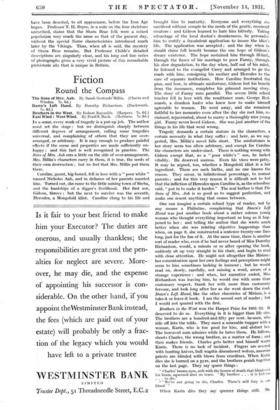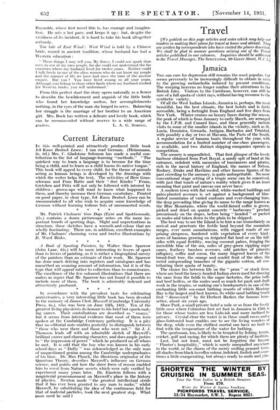Fiction
Round the Compass
IN a sense, every work of tragedy is a put-up job. The author must set the stage : but we distinguish sharply between
different degrees of arrangement, calling some tragedies universal, and complaining of others that they are over- arranged, or arbitrary. It is easy enough to produce painful effects if the scene and properties are made sufficiently un- happy : and this fact is well recognized in practice. The Sons of Mrs. Aab errs a little on the side of over-arrangement. Mrs. Millin's characters carry in them, it is true, the seeds of their own destruction ; but we feel that Mrs. Millie put them there.
Caroline, gaunt, big-boned, fell in love with a " poor white " named Nicholas Aab, and in defiance of her parents married him. Turned out, she came to the little mining town of Sheba, and the hardships of a digger's livelihood. Her first son, Gideon, throve ; but the next to survive was the seventh, Hercules, a Mongoloid idiot. Caroline clung to his life and
brought him to maturity. Everyone and everything she sacrificed without scruple to the needs of the gentle, mooncalf creature : and Gideon learned to hate him bitterly. Taking advantage of the local doctor's drunkenness, he persuaded him to certify a fraudulent application to insure the idiot's life. The application was accepted ; and the day when he should claim full benefit became the one hope of Gideon's dreary existence. The hope sustained him through ill-luck, through the fiasco of his marriage to poor Fanny, through his slow degradation, to the day when, half out of his mind, he listened to the evangelist Carey and arranged to go the roads with him, consigning his mother and Hercules to the care of separate institutions. How Caroline frustrated the plan, and how, in ultimate misfortune, Gideon lost his benefit from the insurance, completes his grimand moving story. The story of Fanny runs parallel. The severe little school teacher fell in love with the remittance man, George Red- marsh, a drunken loafer who knew how to make himself agreeable to women. He went away, and she remained faithful to her memories even after the day she met him, re- claimed, rejuvenated, about to marry a thoroughly nice young girl. Fanny never loved Gideon. She was just another of the things in his life that went wrong.
Tragedy demands a certain stature in the characters, a certain necessity in what they suffer : and here, as we sug- gested, Mrs. Millin's novel falls short. The misfortunes in her story seem too often arbitrary, and except for Caroline the characters are under-sized. There is nothing wrong with Gideon except that, as a " poor white's " son, he lacked vitality. He deserved success. Even his vices were petty. It may be argued, too, whether a Mongoloid idiot is a fair ingredient. There are such births, and no one knows the reason. They occur, in infinitesimal percentage, to normal parents : and for this very reason it is difficult not to feel that the infliction of Hercules upon Caroline is, as the schoolboy said, " put in to make it harder." The real bother is that The Sons of Mrs. Aab is so good as to suggest perfection, and make one resent anything that comes between.
One can imagine a certain robust type of reader, not by any means a Philistine, complaining that Dawn's Left Hand was just another book about a rather solemn young woman who thought everything important so long as it hap- pened to her ; and telling the author that she wrote much better when she was relating objective happenings than when, on page 9, she constructed a sentence twenty-one lines long, just for the fun of it. At the same time, there is another sort of reader who, even if he had never heard of Miss Dorothy Richardson, would, a minute or so after opening the book, suddenly sit up very straight in his chair, and begin to read with close attention. He might not altogether like Miriam : her concentration upon her own feelings and perceptions might seem to him sometimes lacking in humour ; but he would read on, slowly, carefully, not missing a word, aware of a strange experience : and when, her narrative ended, Miss Richardson was leaving him, he would rise with more than customary respect, thank her with more than customary fervour, and look long after her as she went down the road. Dawn's Left Hand, like the other chronicles of Miriam, is a take-it or leave-it book. I am the second sort of reader ; but I would not quarrel with the first.
Brothers in the West won the Harper Prize for 1931-32. It deserved to do so. Everything in it is bigger than life size. The brothers are a hundred-and-fifty per cent. he-men, who ride off into the wilds. They meet a miserable trapper with a woman, Karin, who is too good for him, and abduct her. The bereaved man admires while he hates them. He follows, shoots Charles, the wrong brother, as a matter of form ; and then makes friends. Charles gets better and himself wants Karin. There is no lack of incident. Fingers are severed with hunting knives, bull wapitis disembowel wolves, amorous priests are blinded with blows from crucifixes. When Karin dies she is burned on a pyre, and the brothers perish together on the last page. They say queer things : " Charles' brown eyes, sick with the horror of death that blanketed his brain, squeezed shut on tears. ' My brother . . . it is hideous . . . to die.' ' We're not going to die, Charles. There's still fury in our blood.' " When Karin dies they say queerer things still. Mt. Raynolds, whose first novel this is, has courage and imagina- tion. He sets a hot pace, and keeps it up : but, despite the vividness of its incident, it is hard to take his book altogether seriously.
The tale of East Wind : iVest Wind is told by a Chinese bride, reared in ancient tradition, whose husband has had a Western education : These things I may tell you, My Sister, I could not speak thus even to one of my own people, for she could not understand the far countries where my husband lived for twelve years. Neither could I talk freely to one of the alien women who do not know my people and the manner of life we have had since the time of the ancient empire. But you Y You have lived among us all your years. Although you belong to those other lands where my husband studied his Western books, you will understand."
From this perfect start the story opens naturally as a flower to describe the bewilderment and anguish of the little bride who found her knowledge useless, her accomplishments nothing, in the eyes of the man she longed to serve. Balancing her struggle is the marriage of her brother to an American girl. Mrs. Buck has written a delicate and lovely book, which can be recommended without reserve to a wide range of



































 Previous page
Previous page